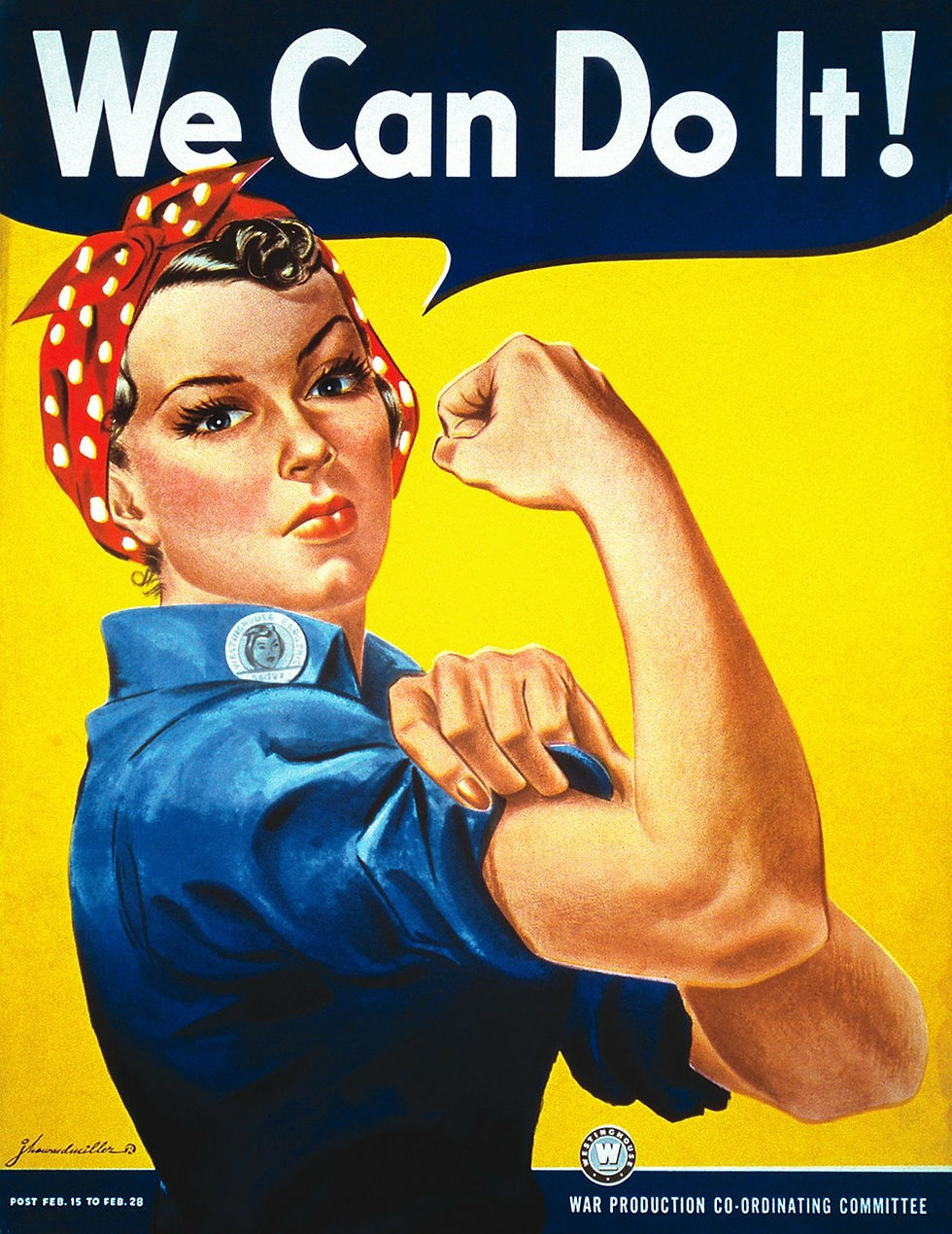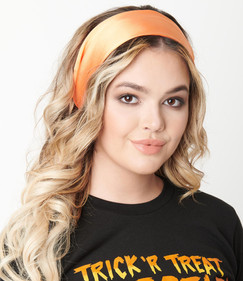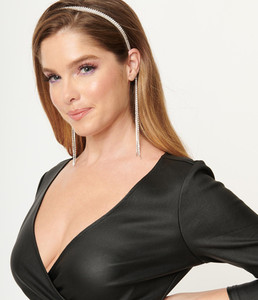Headband Fashion Through the Years
- Retro Chic Shop

- Oct 5, 2021
- 5 min read
Updated: Apr 13, 2024

Headbands are one of the most popular ways to keep your hair in check. If you were born before 1970, then it's likely that at some point during childhood or adolescence headbands became a permanent fixture on your head! A headband not only kept our hair out of our faces, but they helped us look good while doing so.
Headbands have been around for centuries, and they are still popular today! But headband fashion has changed a lot throughout the years. In this article, we will talk about headbands that were popular from the 1920's on.
If you want to know more about retro style headbands, then read on!
1920's Style Headbands
This era introduced headbands to the Western world, when they became a fashion accessory for a generation of women. Headbands were prominently worn by those who wanted to keep their hair from falling into their faces, keep it off their shoulders, and keep it under control. They also served as an alternative to traditional hats which would have been too cumbersome to wear with a voluminous hairdo.
On an everyday basis, they were worn by women working in dusty factory environments where hats would have been impractical. Typically, a scarf was tied across the forehead to maintain modesty and block out dust. They were made from all sorts of materials, including satin, silk or velvet fabrics which stood out against dark work clothing.
Headbands were also a fashion statement in the 1920’s for women who wanted to flaunt their independence. They became an accessory of choice for “flappers”.
However, these weren't your average bandanas, scarves, or turbans; instead, there was a new craze where women would wear them in all sorts of colors with various patterns. Flappers would tie back long hair with an oversize headband and adorn it with jewels, feathers or other decorations that matched what they're wearing.
1930's – 1940’s Style Headbands
Headbands began to be seen as more of a feminine fashion accessory around the 1930’s and were worn outside of the workplace. Then designer Coco Chanel introduced this accessory in the 30’s in a more effortless and casual look, pairing it with belted white trousers.
The headband of the 1940’s became something very different from its fancier predecessors. During World War II, head bands transformed from decorative to utilitarian.
Women ordnance workers, working in plants for the war effort began wearing red scarves around their heads. Headscarves wrapped like turbans were a safety feature protecting their hair from heavy machinery while they worked.

In 1942, artist J. Howard Miller was hired by the Westinghouse Company's War Production Coordinating Committee to produce a series of posters that supported America’s war effort with an inspirational message for women. One such poster is the now-famous "We Can Do It!" which depicts a woman wearing a traditional headscarf and flexing her muscles as proof that women are strong enough to do anything men can - even if it means building bombs or fighting on behalf of our country! The woman in the poster, nicknamed Rosie the Riveter, has become an icon of strong, independent women.
Although the headband lost some of it’s popularity in the 30’s and 40’s, they would be back in the 1950’s.
1950's Style Headbands
In the 50's, headbands were popularized in the movies by Audrey Hepburn and Grace Kelly. The head band styles during the 50’s ranged from hard plastic headbands (Alice bands), wide fabric or knitted bands in stripes and polka dots that were tied behind the ears or knotted on top of your head. Some wore a headband as a sign of modesty and to keep the hair away from the face. Other popular choices include ones with bows for those who wanted an extra feminine touch!
Headbands, bandannas and hair scarves were very popular with teenagers in the late 1950’s. They liked to wear them tied around their ponytails or as neckties that would hang in front of themselves when not being worn in the hair.
Teens and women also liked rolled-up hair with wide bands tucked behind the ears as well as knotted on top of one's head. A variety of styles were popular including stripes, polka dot patterns and floral designs.
Women also started wearing fabric flower clips on their headbands during this time. This was a great way to add color and style.
1960's Style Headbands
Actresses in the 1960’s such as Brigitte Bardot, Catherine Deneuve, and Elizabeth Taylor wore headbands frequently in their movies. First Lady Jackie Kennedy was also seen wearing head bands during the 60’s.
During the 60’s a voluminous hairstyle called the “beehive” became a big women's fashion look paired with a headband. The hair was teased and piled high on top of a headband, creating an exaggerated bouffant look.
The late 60s and early 70s saw the rise of the hippie movement, and a new way to accessorize long hairstyles with headbands. Men and women would wear them across their foreheads, using wide or thin leather bands decorated with Native American beading, feathers & macrame decorations. A popular style for women was flowers made into a headband crown. During this time, head bands were all about “peace” and “love”.
1970's Style Headbands
70's headband styles became all about glamour and luxury. Many women wore rhinestone encrusted retro style headbands in their hair during this time period. Celebrities such as Diana Ross, Bianca Jagger, Linda Ronstadt, Barbara Streisand, and Cher were often seen wearing a headband during the 70’s.
As discos became popular, disco style included headbands that were brightly colored and usually made of satin or metallic fabric. These headbands became popular during the disco era and were often chosen by women in an attempt to copy their favorite celebrities.
1980's Style Headbands
The headband fad in this decade owes a large nod to Madonna's iconic 1980s look along with her fishnet stockings, lace gloves, cross necklaces, etc. Her headbands were big, with large floppy bows worn to one side.
Throughout the 80’s, the headband became an accessory for both fitness attire and casual outfits. Stars such as Jane Fonda created workout videos and wore sports headbands with their workout gear. Neon spandex with matching or contrasting headbands was an eye-catching workout fashion look. Olivia Newton-John released her video “Physical” in which she sported these colorful tight workout clothes complete with headband.
And in 1985, Princess Diana famously wore an heirloom emerald choker as a headband pairing it with a teal satin evening gown.
Other headband trends in the 80’s included headbands with long dangling bits such as feathers or chains worn with big hair. In order to pull off the 80’s big hair look, the proper accessory was a great headband.
1990's Style Headbands
Headbands became tamer in the '90s where they were usually simple black or brown elastic bands paired with casual clothing like jeans. The Alice band returned to prominence with Hillary Clinton wearing them frequently while on the campaign trail and as First Lady.
In the 90’s movie ‘Clueless’, Alicia Silverstone and Stacey Dash’s characters Cher and Di preferred the stretchy fabric variety of headbands, which they wore in a variety of colors throughout the film.
And, in 1991 during the Super Bowl , Whitney Houston sang her iconic rendition of the national anthem while wearing a white track suit, white Nikes, and matching white headband!
Headbands have certainly been a staple of fashion since the 1920s and they come in many styles, designs, colors & patterns. A headband can be worn for casual or dressy occasions and paired with any hair length from short to long. Just like all fashion accessories, headbands are continuing to evolve and will never go out of style!
Shop for headbands at:
Retro Chic Shop -
Unique Vintage -
https://uniquevintage.ojrq.net/vnjVrO (headbands)
https://uniquevintage.ojrq.net/yRbk5v (hair accessories)
Macy's -
This page contains affiliate links.
At no cost to you, we may earn a small commission from these links.
As an Amazon Associate we earn from qualifying purchases.


























Comments